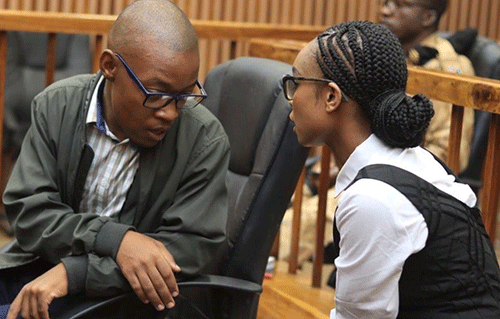Windhoek High Court judge Christi Liebenberg made it abundantly clear yesterday that he will not be prescribed to when considering sentences to be imposed against convicted offenders.
He made these remarks when he sentenced Azaan Madisia (31) and her brother Steven Mulundu (25) to six and four years imprisonment each, on a charge of defeating the course of justice.
Madisia was further sentenced to one year on each of the two fraud convictions she received.
The judge, however, ordered that the sentences are served concurrently. Judge Liebenberg imposed a sentence of eight years on Madisia and six years on Mulundu, but suspended two years on each sentence for a period of five years on the condition they are not convicted of defeating the course of justice during the period of suspension.
The siblings were convicted after they buried the body of Shannon Wasserfall, who was 21 years old, in a shallow grave near the Dunes Mall in Walvis Bay in April 2020. Wasserfall was missing for six months and an active social media campaign was launched by her family and friends to find her. All this was, however, in vain as the only persons who knew about her whereabouts, Madisia and Mulundu, kept it a secret.
The judge exonerated them on charges of murder and robbery over the death of Wasserfall, which led to scenes of unrest as family and friends were visibly upset with the judgement and shouted “justice for Shannon” and called the judgement a
“farce”.
Judge Liebenberg found that the State did not prove beyond a reasonable doubt that Madisia and Mulundu were culpable for the death of Wasserfall.
Yesterday, Judge Liebenberg said that while he has sympathy for the family members of Wasserfall who felt shortchanged by the judgement, he will not be swayed by public pressure to impose sentences that are not in line with the offences committed.
“When considering the interests of society, this court is alive to its duty to uphold and promote the rule of law in society through its judgements and to reflect society’s indignation and antipathy towards those making themselves guilty of serious crimes. In the present instance, statements allegedly made by the family of the deceased and members of the public were reported in the media following the judgement, undoubtedly for purposes of influencing the court at sentencing. It should be made clear to all that, what is required of this court today is to punish the accused persons for the crimes they stand convicted of, based on the facts and law as set out in this court’s earlier judgement, and not for crimes society expected them to be guilty of. For the court to give in to public expectation, as opposed to considering how public interest could be best served, would result in a travesty of justice,” Judge Liebenberg stressed.
He went on to say though one might have empathy with those who harbour strong feelings of resentment towards the accused persons and want to see the court mete out severe punishment on them, it needs equally to be recognised that public expectation is not synonymous with public interest.
According to the judge, the court has a duty to serve the interests of society and though it should not be insensitive towards or ignorant of public feelings and expectations, it may not blindly adhere thereto. He added: The court does not sentence in a vacuum, but punishes the offender with full regard to his or her own personal circumstances, considered against the nature and seriousness of the crime committed and the interests of society.
In this instance, he said, the accused’s deliberate silence and false statements well-knowing the anguish and suffering of the deceased’s family calls for a custodial sentence.
Pic: Madisia


